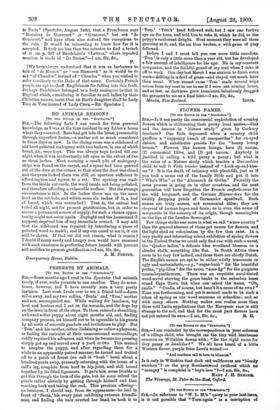FLOWER NAMES.
[TO THE EDITOR Or TUN " SPACTATOR.'1
SLE,^-Is it not partly the commercial exploitation of country flowers which is obliterating their pretty local names,—that and the lessons in "Na-hire study" given by Cockney teachers ? One feels depressed when a country child proffers a "tuppenny bunch of marguerites" for ox-eyed daisies, and substitutes genista for the "bonny bonny broom." Flowers, like human beings, have (1) names, (2) ceremorial titles, and (3) pet names. Anybody is justified in calling a wild pansy a pansy; but what is the value of a Nature study which teaches a Devonshire child to call it Viola tricolor instead of " Leok-up-and-kisse me " ? It is the death of intimacy with plant-life, just as if you took a name out of the family Bible and put it into " Who's Who" or the " Abnanach de Gotha." Probably the same process is going on in other countries, and the next generation will have forgotten. the French conforte-cceur for the wild bergamot, and the German Manner-treu for the swiftly dropping petals of Germander speedwell. Such names are truly names, not ceremonial titles; they are eloquent of human hopes and fears; as is even the name of marguerite in the country of its origin, though meaningless on the lips of the London flower-girl.
Few things strike one more in what we call "anew country" than the general absence of these pet names for flowers, and the light shed on colonisation by the few that exist. In a very pretty and interesting school exhibition of spring flowers in the United States we could only find one with each a name, the "Quaker ladies," a delicate blue woodland blossom on a slender stalk, something like flax. In South Africa there seem to be very few indeed, and those there are chiefly Dutch. The English names are apt to be either wildly inaccurate or ugly and materialistic,—e.g.," sugar-bush" for the beautiful protea, "pig-lilies" for the arum, "sour-fig" for the gorgeous mesembryanthemum. There was an exquisite coral-tinted wood-sorrel starring the grass banks in the suburban lanes round Cape Town, but when one asked the name, "Oh, oxalis." "Oxalis, of course, but hasn't it a name of its own?" None was forthcoming, and yet it seemed made to be such a token of spring as our wood anemone or celandine ; and so with many others. Nothing makes one realise more than these cold Latin appellations that the European race is still strange to the soil, and that for the most part flowers have
not yet entered its anra.—I am, Sir, &c., R.. B.






































 Previous page
Previous page